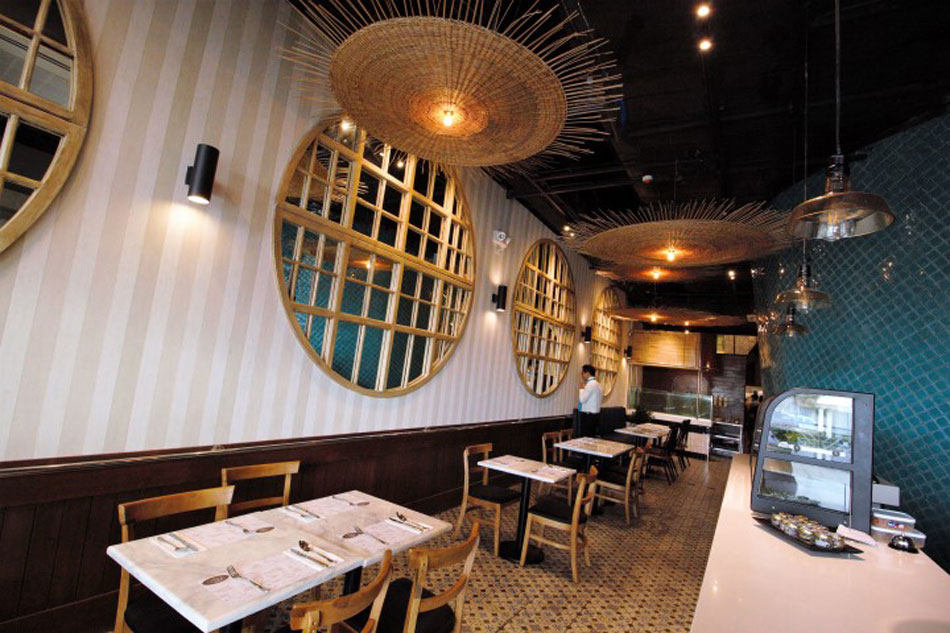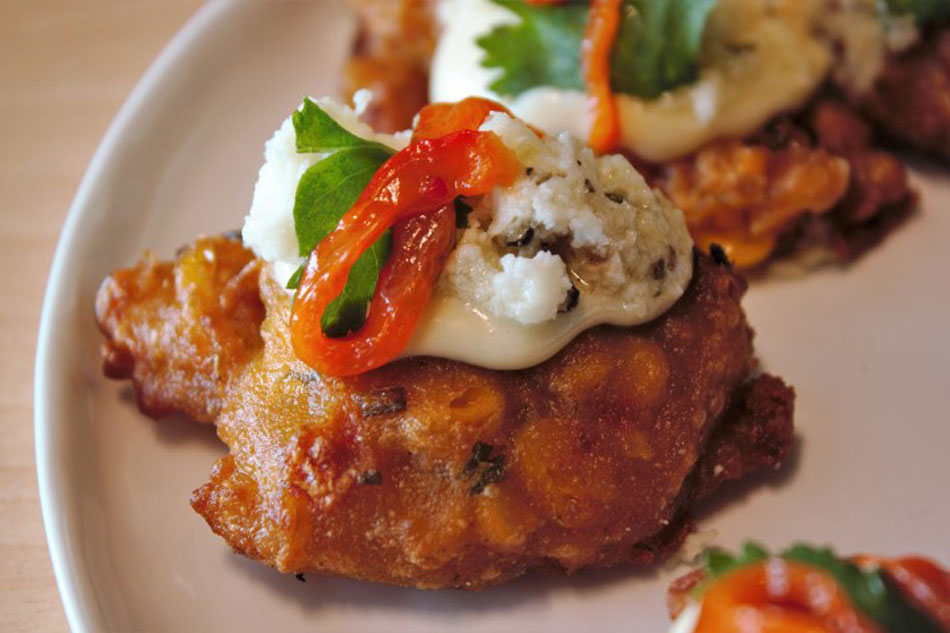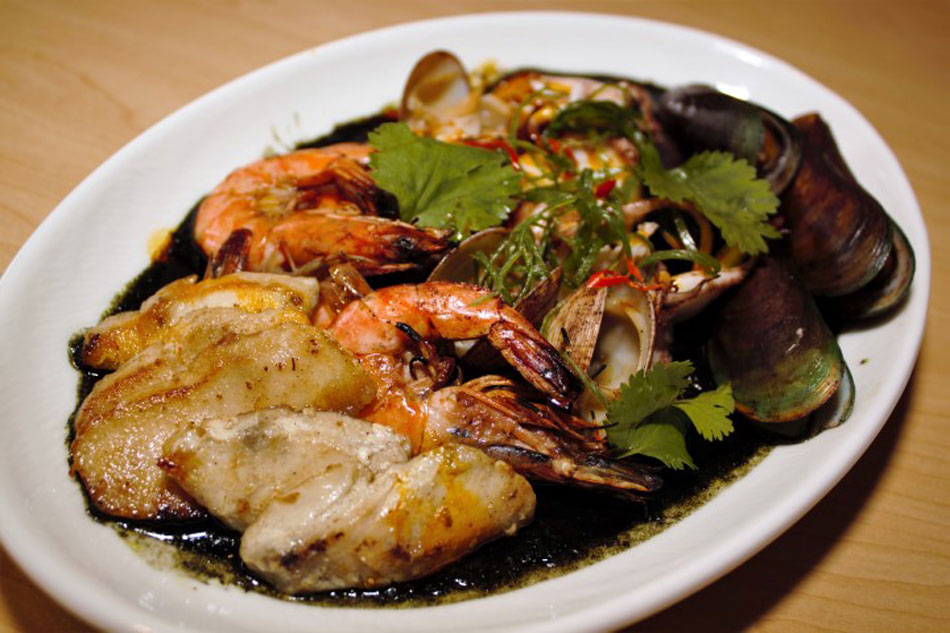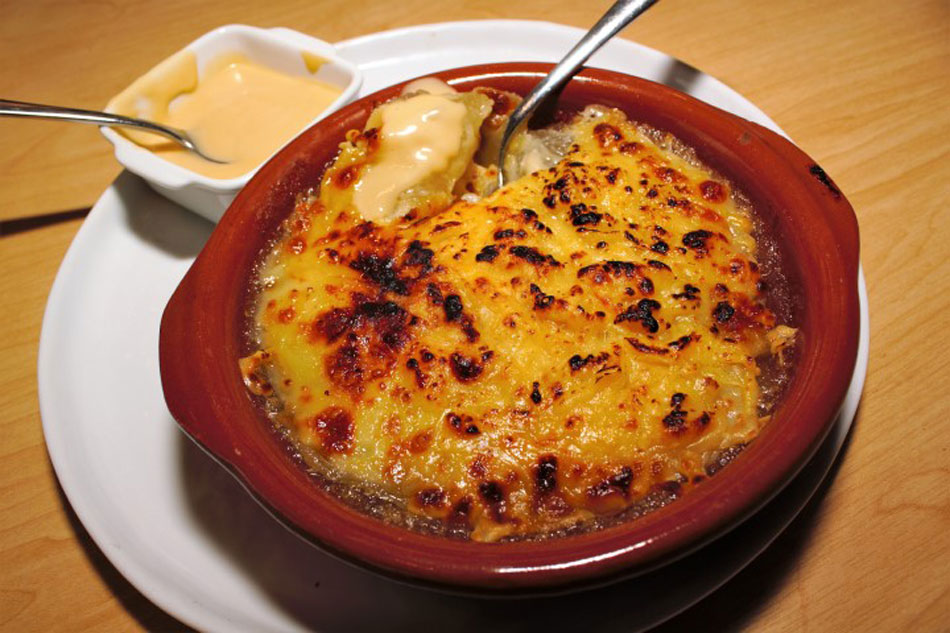New eats: Chef Tatung serves Pinoy history on a plate at Agos
ADVERTISEMENT

Welcome, Kapamilya! We use cookies to improve your browsing experience. Continuing to use this site means you agree to our use of cookies. Tell me more!
New eats: Chef Tatung serves Pinoy history on a plate at Agos
Joko Magalong
Published Nov 24, 2016 04:36 PM PHT
|
Updated Nov 24, 2016 06:31 PM PHT
MANILA -- Chef Tatung Sarthou reimagines Filipino cuisine at his new restaurant Agos at the SM Mall of Asia.
MANILA -- Chef Tatung Sarthou reimagines Filipino cuisine at his new restaurant Agos at the SM Mall of Asia.
Tucked away in a new corner of the mall, with views of Manila Bay, the restaurant seems kismet with the soon-to-open Manila-Acapulco Galleon Museum nearby.
Tucked away in a new corner of the mall, with views of Manila Bay, the restaurant seems kismet with the soon-to-open Manila-Acapulco Galleon Museum nearby.
“I’ve been working on the concept for two years, then biglang coincidence, merong [space] sa SM MOA,” explained Sarthou of its location.
“I’ve been working on the concept for two years, then biglang coincidence, merong [space] sa SM MOA,” explained Sarthou of its location.
While unintended, everything about the restaurant seems to match beautifully with the museum.
While unintended, everything about the restaurant seems to match beautifully with the museum.
ADVERTISEMENT
Agos’ space is narrow and long, with interiors reminiscent of a ship with tiled walls, wood and steel nautical accents, and, in keeping with its name, flowing water.
Agos’ space is narrow and long, with interiors reminiscent of a ship with tiled walls, wood and steel nautical accents, and, in keeping with its name, flowing water.
Cuisine-wise, Sarthou explores local dishes and various iterations of known classics, as well as cooking methods from different parts of the archipelago. He delves into using and imagining what was historically available in our market (some thanks to the Galleon trade) when some of these dishes were first created, as well as their evolution.
Cuisine-wise, Sarthou explores local dishes and various iterations of known classics, as well as cooking methods from different parts of the archipelago. He delves into using and imagining what was historically available in our market (some thanks to the Galleon trade) when some of these dishes were first created, as well as their evolution.
“I just wanted to showcase how Filipinos innovate by replacing ingredients to cook dishes,” he explained.
“I just wanted to showcase how Filipinos innovate by replacing ingredients to cook dishes,” he explained.
With a six-page menu filled with tweaked versions of Filipino favorites, as well as some dishes that most of Manila might not have tasted before, here are five items to try in Agos’ menu.
With a six-page menu filled with tweaked versions of Filipino favorites, as well as some dishes that most of Manila might not have tasted before, here are five items to try in Agos’ menu.
1. Maruyang Mais
Corn isn’t top of mind when we think of maruya. Instead of sweet, Tatung’s version is savory. Roasted bell peppers are added into the corn batter, and fried until crispy. Each fritter is topped with a garlic aoli that nicely interplays with the sweetness of the corn and roasted bell pepper, while quesong puti adds a slight tangy bite, as well as saltiness. Squeeze some lemon or calamansi, if you like things a little more balanced.
Corn isn’t top of mind when we think of maruya. Instead of sweet, Tatung’s version is savory. Roasted bell peppers are added into the corn batter, and fried until crispy. Each fritter is topped with a garlic aoli that nicely interplays with the sweetness of the corn and roasted bell pepper, while quesong puti adds a slight tangy bite, as well as saltiness. Squeeze some lemon or calamansi, if you like things a little more balanced.
ADVERTISEMENT
2. Paella Fiesta Filipina
Paella is one of the Agos’ house specialties. Sarthou, an advocate of using local produce, uses Ifugao tinawon rice instead of the traditional Spanish Bomba rice.
Paella is one of the Agos’ house specialties. Sarthou, an advocate of using local produce, uses Ifugao tinawon rice instead of the traditional Spanish Bomba rice.
Agos’ Fiesta Filipina Paella comes to the table steaming with beautifully plumped up deep-orange-tinged rice with seafood, chicken, smoked pork jowl (used instead of chorizo), and vegetables. It’s a wet paella with not much socarrat, and instead of using saffron, Sarthou uses achuete (annatto), which gives this paella a slight smokiness, and even sweetness, making you wonder for a moment why you ever needed to buy that pack of expensive saffron.
Agos’ Fiesta Filipina Paella comes to the table steaming with beautifully plumped up deep-orange-tinged rice with seafood, chicken, smoked pork jowl (used instead of chorizo), and vegetables. It’s a wet paella with not much socarrat, and instead of using saffron, Sarthou uses achuete (annatto), which gives this paella a slight smokiness, and even sweetness, making you wonder for a moment why you ever needed to buy that pack of expensive saffron.
3. Zarzuela Zamboangena
While most people think of zarzuela as a Filipino/Spanish dance or play, it can also mean a Spanish seafood dish. Agos’ Zarzuela Zamboangena takes grilled seafood like shrimp, fish, clams, mussels, and even curacha, and sits these atop a pianggang sauce.
While most people think of zarzuela as a Filipino/Spanish dance or play, it can also mean a Spanish seafood dish. Agos’ Zarzuela Zamboangena takes grilled seafood like shrimp, fish, clams, mussels, and even curacha, and sits these atop a pianggang sauce.
Pianggang, a Tausug sauce, has always been a part of Sarthou’s signature dishes. It was in one of his bestsellers in his previous restaurant Alab and also in one of the dishes that he presented at the recent Madrid Fusion Manila.
Pianggang, a Tausug sauce, has always been a part of Sarthou’s signature dishes. It was in one of his bestsellers in his previous restaurant Alab and also in one of the dishes that he presented at the recent Madrid Fusion Manila.
In Zarzuela Zamboangena, the flavors play and dance. While pianggang is mostly served with chicken, eating it with grilled seafood seems so right. Jet-black, thanks to burnt/black coconut and payama itum (black coconut paste), Agos’ pianggang sauce is complex, has dark and rich flavors, sweet coconut notes, and a lingering tinge of spice, perfectly complementing the sweet and grilled flavors of the seafood.
In Zarzuela Zamboangena, the flavors play and dance. While pianggang is mostly served with chicken, eating it with grilled seafood seems so right. Jet-black, thanks to burnt/black coconut and payama itum (black coconut paste), Agos’ pianggang sauce is complex, has dark and rich flavors, sweet coconut notes, and a lingering tinge of spice, perfectly complementing the sweet and grilled flavors of the seafood.
ADVERTISEMENT
If you’ve been to Zamboanga and tasted pianggang, this dish will definitely take you back. A must-try.
If you’ve been to Zamboanga and tasted pianggang, this dish will definitely take you back. A must-try.
4. Pollo con Salsa Tsokolate
The concept of mixing chicken and chocolate will deter a lot of people from ordering this dish, but Filipino savory chocolate dishes have been around since the turn of the century, thanks to the Philippines being part of the galleon trade which passed through cocoa-producing Mexico.
The concept of mixing chicken and chocolate will deter a lot of people from ordering this dish, but Filipino savory chocolate dishes have been around since the turn of the century, thanks to the Philippines being part of the galleon trade which passed through cocoa-producing Mexico.
When you see this dish, it has the color of dinuguan. When you taste it, you’ll be surprised about how not so strange it is. The sauce reminded me of a spicy barbecue java sauce with the taste of that somewhat bitter tablea/chocolate only coming in at the end. This dish will expand your tastebuds, and will have you reaching for more rice.
When you see this dish, it has the color of dinuguan. When you taste it, you’ll be surprised about how not so strange it is. The sauce reminded me of a spicy barbecue java sauce with the taste of that somewhat bitter tablea/chocolate only coming in at the end. This dish will expand your tastebuds, and will have you reaching for more rice.
5. Chef Tatung’s 3-Cheese Bibingka delight
Served in a ramekin with a bubbly brown-speckled top layer of melted cheeses is Chef Tatung’s 3-Cheese Bibingka delight. Hiding underneath melted mozzarella, quesong puti and cheddar is a melty cassava bibingka (bibingkang kamoteng kahoy or most commonly known as cassava cake), interspersed with nata de coco pieces.
Served in a ramekin with a bubbly brown-speckled top layer of melted cheeses is Chef Tatung’s 3-Cheese Bibingka delight. Hiding underneath melted mozzarella, quesong puti and cheddar is a melty cassava bibingka (bibingkang kamoteng kahoy or most commonly known as cassava cake), interspersed with nata de coco pieces.
Think molten cassava cake with thick and gooey melted cheese, and just to completely blow it out of the park, there’s a salted egg sauce that goes with it. This is cassava cake like you’ve never had it before, it’s truly delightful! Try it.
Think molten cassava cake with thick and gooey melted cheese, and just to completely blow it out of the park, there’s a salted egg sauce that goes with it. This is cassava cake like you’ve never had it before, it’s truly delightful! Try it.
ADVERTISEMENT
While eating at Agos may be part history lesson, I found nothing boring about it. Instead, each dish that I tasted fascinated me, and made me wonder how it came to be. I can imagine endless hours of talking about why he decided to use cassava instead of the more popular rice grain in the bibingka, or the history of maruyang mais and its similarity to the Indonesian dish Bakwan Jagung.
While eating at Agos may be part history lesson, I found nothing boring about it. Instead, each dish that I tasted fascinated me, and made me wonder how it came to be. I can imagine endless hours of talking about why he decided to use cassava instead of the more popular rice grain in the bibingka, or the history of maruyang mais and its similarity to the Indonesian dish Bakwan Jagung.
Agos serves dishes that are familiar and yet not, not entirely changing the dish’s form or going to the extent of it being fusion. Instead, Sarthou tweaks dishes as per a historical reference -- all of these make Agos one of the more interesting, and intellect- and palate-satisfying places to eat Filipino food in Manila.
Agos serves dishes that are familiar and yet not, not entirely changing the dish’s form or going to the extent of it being fusion. Instead, Sarthou tweaks dishes as per a historical reference -- all of these make Agos one of the more interesting, and intellect- and palate-satisfying places to eat Filipino food in Manila.
ADVERTISEMENT
ADVERTISEMENT









